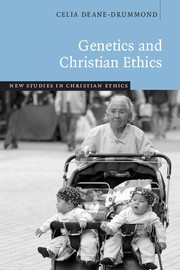Book contents
- Frontmatter
- Contents
- General Editor's preface
- Acknowledgments
- Introduction
- 1 A recovery of virtue for the ethics of genetics
- 2 Theological principles
- 3 Living in the shadow of eugenics
- 4 Genetic testing and screening
- 5 Genetic counselling
- 6 Gene therapies
- 7 Gene patenting
- 8 Women and genetic technologies
- 9 Genetics and environmental concern
- Postscript: Concluding remarks
- Bibliography
- Index
9 - Genetics and environmental concern
Published online by Cambridge University Press: 05 June 2012
- Frontmatter
- Contents
- General Editor's preface
- Acknowledgments
- Introduction
- 1 A recovery of virtue for the ethics of genetics
- 2 Theological principles
- 3 Living in the shadow of eugenics
- 4 Genetic testing and screening
- 5 Genetic counselling
- 6 Gene therapies
- 7 Gene patenting
- 8 Women and genetic technologies
- 9 Genetics and environmental concern
- Postscript: Concluding remarks
- Bibliography
- Index
Summary
I argued in the previous chapter that a Christian concept of justice relating to genetic technologies necessarily includes concern for the underprivileged. I propose here that justice also needs to be thought of in ecological rather than narrowly anthropocentric categories. This does not mean that animals, for example, are now the underprivileged that the Christian gospel speaks about, as Andrew Linzey suggests. Instead, I propose that we need to broaden the remit of our moral consideration so that it includes animals and plants as well as ecosystems. On the basis of belief in God as Creator, all of creation has value in and of itself. However, such a theocentric view can still allow for distinctions between humanity and the non-human world. A focus on virtue ethics might even suggest that it is impossible to give moral consideration to those outside the human community. I will argue here that looking for human character attributes elsewhere in the non-human world is not very helpful in defining human relationships with the natural world. The distinctiveness of all aspects of creation needs to be preserved, along with an awareness of common genetic and biological origin. Concepts such as ‘covenant’ and ‘friendship’ are particularly helpful in setting the stage for a consideration of the limits or otherwise of genetic intervention outside the human community.
- Type
- Chapter
- Information
- Genetics and Christian Ethics , pp. 220 - 244Publisher: Cambridge University PressPrint publication year: 2005

